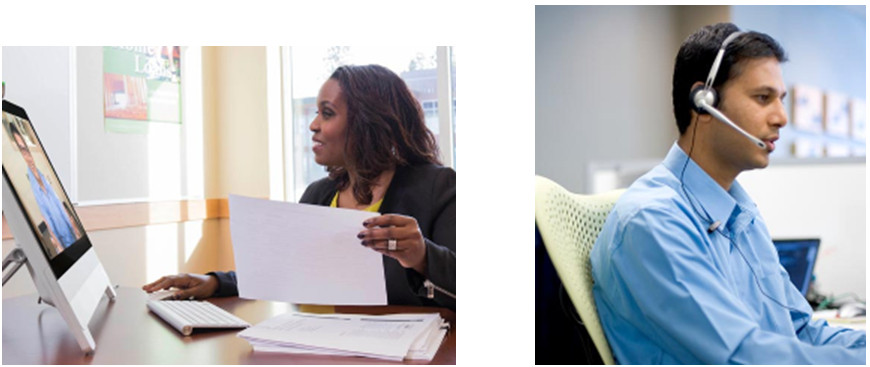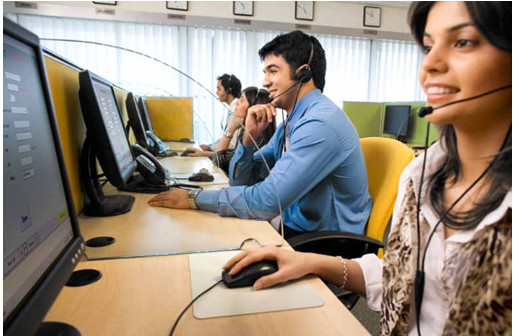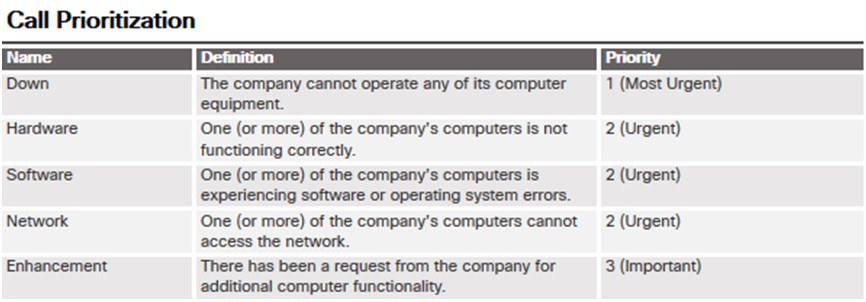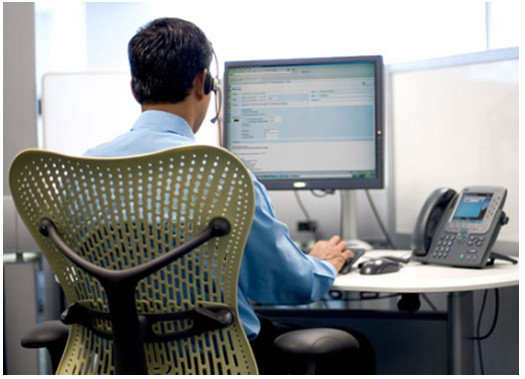Sections & Objectives
13.1 Communication Skills and the IT Professional
- Explain why good communication skills are a critical part of IT work.
13.2 Ethical and Legal Issues in the IT Industry
- Explain appropriate behavior when faced with the legal and ethical issues that arise in the IT industry.
13.3 Call Center Technicians
- Explain the call center environment and technician responsibilities.
13.4 Chapter Summary
13.1 Communication Skills and the IT Professional
13.1.1 Communication Skills, Troubleshooting and the IT Professional

Establish good communication skills
- Listen to your customer to learn the details of the problem
- Speak directly with the customer
- Gather information from the customer
- Present yourself professionally
- Keep your own emotions in check
13.1.2 Working with a Customer

Determine customer problem
- Listen actively to customer problem
- Do not interrupt
- Understand the problem, ask to clarify as necessary
Display professional behavior
- Treat customer with respect and prompt attention
- Know the proper procedure to put a customer on hold or transfer a call
- Explain how you can assist the customer
Stay focus
- Keep the communications focus on the customer issue
- Understand how to deal with different customer types
Proper netiquette
- Practice good netiquette when communicating online with the customer
13.1.3 Employee Best Practices

Time and stress management
- Prioritize your activities by following the business policy
- Compose yourself between customer calls
- Adjust your work station to help you do your job
Observe SLAs
- SLA defines an agreement between the interested parties.
- When dealing with customers, you need to observe the content of the SLA.
- Management determines the exceptions to the SLA.
Follow business policies
- Handling customer calls
- Call center activities
- Ensuring customer satisfaction
13.2 Ethical and Legal Issues in the IT Industry
13.2.1 Ethical and Legal Considerations
Respect your customers, their equipment and intellectual property.
Legal consideration
Some examples:
- Do not make any changes to the software and hardware configuration without permission
- Do not access customers’ user accounts without permission
- Do not violate the copyright laws
- Do not use customers’ IT resources without permission
Licensing
- Personal license: The program usually runs on only one machine
- Enterprise license: The company pays for the employees to use the software
- Open source license: This license allows developers to modify and share the codes
- Commercial license: The commercial license allows the licensee to make money from the software
- Digital rights management: The software is designed to prevent illegal access to digital content and devices
13.2.2 Legal Procedures Overview
Computer forensics
- The collection and analysis of data from computers and related devices
- Two types of data collected:
- Persistent data is usually stored on a drive and preserved when computer is turned off.
- Volatile data is lost when the computer is turned off. Volatile data includes data in transit and data that is temporarily stored in RAM, cache and registries.
Cyber law and first response
- IT professionals must understand their responsibility and liability relating to cybercrimes in their country, region, or state.
- Know your company’s policy regarding cybercrimes.
- Understand how to preserve evidence if illegal activity is discovered.
Documentation and chain of custody
- Always document the work performed.
- Chain of custody documents how the evidence was collected, who has access to the evidence, and where it is stored.
13.3 Call Center Technicians
13.3.1 Call Centers, Level One Technicians, and Level Two Technicians
Call Centers
- Busy, fast-paced, possibly 24/7 work environment
- Could be internal or a service to outside customer
- Has business policies regarding call priority
- Uses support software to manage the job functions
- Technicians with different experience levels

Level 1 Technicians
- Gather pertinent information from the customer
- Resolve simple issues and escalate the work order when necessary
- What questions should a Level 1 technician ask the customer?
Level 2 Technicians
- Probably have remote software capabilities to assist with resolving customer issue
- Calls the customer back to ask any additional questions.
- Usually more knowledgeable about technology.
- Deals with escalated work order

13.4 Chapter Summary
To become a successful technician, you will:
- Use good communications skills with customers and co-workers
- Conduct business in a professional manner
- Practice good netiquette
- Comply with customer’s SLA
- Follow business policies
Practice good time and stress management skills - Familiarize yourself with cyber laws in your country, region, or state
- Know your responsibility in the fight against cybercrimes
